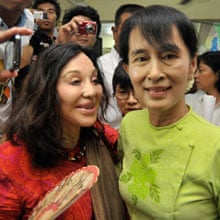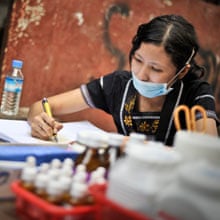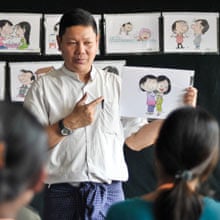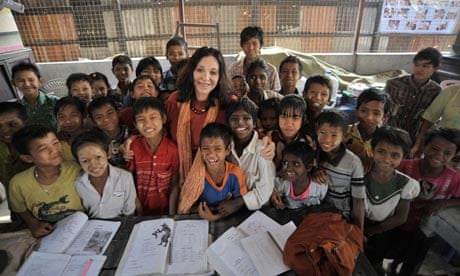We are sitting in the office of Burma's chief of police in Nay Pyi Taw, the national capital of what, until a few months ago, was one of the most closed societies on Earth. Carved out of jungle and scrubland in 2005 at a reported cost of £2bn, Nay Pyi Taw is the ultimate socialist vanity project, a testament to the vaulting ambitions of the secretive military junta that has ruled Burma for more than four decades. To obtain this rare audience, we have had to negotiate numerous roadblocks and armed checkpoints. Despite the recent installation of a western-friendly civilian government, I am half-expecting to be escorted to the border. Instead, we are sitting in high-backed teak chairs sipping tea with the chief of police and discussing how the countess's development agency, Association François Xavier-Bagnoud, can help the government address the problem of human trafficking and the diseases, such as Aids, that come in its wake. I should say straight away that Albina du Boisrouvray, as she is more usually known, hates being called "Countess", though clearly her title must have come in useful when dealing with the generals.
For today's meeting, she is wearing a lightweight summer dress with a floral print, high heels, and large spiral earrings studded with what look like small diamonds. The jewellery appears expensive but, as Du Boisrouvray reveals later when we return to our hotel, the earrings are vintage and the "diamonds" are glass. The dress, meanwhile, was designed by an acquaintance. Nevertheless, Du Boisrouvray exudes Rive Gauche glamour and I am fairly sure that the chief of police and his colleagues dressed, like him, in regulation-issue blue uniforms have never seen anything quite like her.
But appearances can be deceptive and none more so than in the case of Du Boisrouvray, a regular visitor to Burma who has been sharing uncomfortable truths with the junta for 20 years. Pleasantries and the ritual exchange of business cards over, it is no surprise when she launches into her spiel, about how FXB is no fly-by-night development agency but is passionately committed to fighting Burma's burgeoning Aids epidemic and working for the long-term betterment of the country and its people.
FXB's philosophy, she explains, quoting the words of her intellectual mentor, Jonathan Mann, the former head of the World Health Organisation's Aids programme, is that you cannot hope to defeat an epidemic disease such as Aids without also addressing fundamental political and social issues. "As Jonathan used to put it: health and human rights are inextricably linked," says Du Boisrouvray. "They go hand in hand."

If the chief of police is surprised by her reference to human rights in a country notorious for summary detentions and the torture of political prisoners he doesn't show it. Instead, he smiles and tells her that he has heard many good things about FXB's Burma programmes and would welcome the opportunity to collaborate on human trafficking issues, something the Ministry of Interior recently decided should be made a political priority. "But tell me," he asks, momentarily departing from the official script, "what is it that first brought you to Burma?"
Du Boisrouvray hesitates, considering how best to respond. FXB's motto is "Forgotten people, forgotten issues, in forgotten places". But in the case of Burma, that is only the beginning of the story. To understand how Du Boisrouvray came to be involved in Burma and how she has managed to keep FXB's programmes afloat during the darkest days of the junta, one has to return to Mali and the 1986 Paris-Dakar rally. It was during that race that her only son, François, plunged to his death while flying a rescue helicopter over the desert.
Aged 24, François had been flying helicopters for his father Bruno Bagnoud's alpine rescue company, Air-Glaciers, since the age of 11 and was a highly experienced pilot, which is why Thierry Sabine, the rally organiser, had picked him to man his dual-control Ecureuil helicopter.
No one knows exactly what happened, but it appears that after being forced to land in a sandstorm in Mali at night, Bagnoud took off again, only to crash into a dune some 20 miles short of his destination. By the time Du Boisrouvray reached the crash site, it had been thoroughly picked over by Tuareg nomads, but from the skid marks she and her husband guessed the helicopter must have suddenly lost power and flipped over as François attempted a soft landing. Besides Bagnoud and Sabine, there were three other passengers, including the singer-songwriter Daniel Balavoine. No one survived.

Du Boisrouvray, then a film producer with little interest in health and development issues, was devastated. Her response was to abandon film – in a career spanning 17 years she produced 16 features, including the 1984 desert war romance, Fort Saganne, starring Gérard Depardieu – and set up a foundation in her son's name. In 1989, she auctioned her jewellery and art collection, as well as a substantial slice of her father's real estate business, at Sotheby's in New York and put $100m into FXB.
One of her first acts was to join forces with Médecins du Monde and lobby the United Nations to adopt the Convention on the Rights of the Child. To persuade countries to ratify the convention, Du Boisrouvray joined 15 destitute children on a voyage retracing the routes of African slavers. The voyage opened her eyes to the plight of vulnerable children, an issue close to her son's heart. It also coincided with growing concerns about the worldwide spread of HIV and Jonathan Mann's warning that the Aids epidemic was creating thousands of orphans, many of them infected with HIV.
"That was something no one had thought very much about at the time," says Du Boisrouvray. "I thought, this is where FXB can really make a difference."
To make the best of FXB's limited resources, she decided to channel aid specifically to children already infected with HIV. At the same time, she began supporting the extended families and communities caring for those children by setting up "FXB villages" offering everything from medical and psychosocial care to educational training and microfinance initiatives. The result is a network of more than 100 programmes in 15 countries, including South Africa, Uganda, Colombia and Thailand, with 450 employees and more than 1,000 volunteers.
While bigger NGOs such as Save the Children may be better funded, FXB aims to punch above its weight by fostering deep relationships in the countries where it operates and committing to women and children for the long term. Du Boisrouvray is also fearless when it comes to making the connection between health and human rights. Indeed, one of the most remarkable aspects of her story is that it was her concern for the plight of sex workers who were being trafficked across the Burmese border to Thailand and her determination to repatriate the survivors, many of whom had been infected with HIV, that first forced the generals to confront the truth about the Aids epidemic in Burma and their responsibility for the ravages it was inflicting.
"When I came here in 1992 the generals knew nothing about Aids," she explains when I first meet her in Rangoon on a sweltering night in February. "In the beginning, I think their primary concern was for the military and for their own families. But bit by bit they have opened up."

Du Boisrouvray is sitting on the veranda of the Governor's Residence, a luxury hotel in the embassy district modelled on a 1920s colonial-style British mansion. The fan-cooled verandas and verdant gardens are awash with returning expats and businessmen hungry to ink deals before the expected lifting of western sanctions in April. You can tell how much Burma has changed in the last year simply by the number of laptops and iPads open at adjoining tables.
Prior to the installation of a civilian-led government in March 2011, access to the internet was strictly controlled and dissidents faced arrest and detention for posting blogs critical of the regime. Now former "enemies of the state", such as Aung San Suu Kyi, the National League for Democracy (NLD) leader who spent a total of 15 years under house arrest in Rangoon, are allowed to campaign openly for parliament and foreign journalists are increasingly free to ask uncomfortable questions, though the Burmese press is still subject to close censorship.
"I never thought this day would come," says Du Boisrouvray. "It's wonderful to see this opening up. Let's just hope Burma doesn't go the way of its neighbours and surrender to consumerism."
In the autumn of 1992, when Du Boisrouvray arrived in Rangoon for the first time, it was a different world: "No taxis, no street lights, everything plunged in darkness." There had been parliamentary elections two years earlier but, although the NLD had won a resounding majority, the military had not allowed parliament to convene. Instead, General Ne Win, the leader of the 1962 coup d'etat, ruled Burma as a nominally socialist republic, pursuing a ruinous policy of economic isolation while rigging the constitution to ensure the military would always command a parliamentary majority.
It had taken several months for Du Boisrouvray to arrange a visa. Her representations were not helped by the fact that earlier that summer, at the 1992 international Aids conference in Amsterdam, she had accused the junta of complicity in the murder of eight prostitutes. The previous year, with the help of a group of activist Thai lawyers, FXB and Médecins du Monde had rescued eight underage Burmese sex workers, as well as girls of other nationalities, from a brothel in Chiang Mai in Thailand.
But while the Chinese and Laotians had been repatriated, the Burmese girls never made it home. Instead, Du Boisrouvray was told their bodies had been seen floating in a river on the Thai-Burmese border. Her assumption was that they had been murdered by Burmese border guards. "I was screaming, 'I've got to know what happened to these girls because it's rumoured they've been killed because they were HIV positive.' I told the delegates, 'You're talking about the prostitution of underage children but I've got a precise case; won't you help me to do something about it?'"
By now, Du Boisrouvray had also discovered other girls being trafficked to brothels in Ranong in western Thailand near the south tip of Burma. Incensed, she informed her friend Saisuree Chutikul, a Thai cabinet minister, who in turn instructed the Thai police to raid the brothels. They rounded up 270 women, including 95 Burmese, half of whom were HIV positive. It was Du Boisrouvray's determination to make sure they did not suffer the same fate as the other women and that they would receive access to medicines and psychosocial support in their home country that convinced her to go to Burma.
Not surprisingly, at first the generals were unwelcoming and refused to grant her a visa. But eventually, after she called on her contacts at the French embassy and Burmese medics sympathetic to her cause, the regime relented. To this day, Du Boisrouvray does not know precisely what prompted their change of heart but, given her later discovery that the girls were most likely murdered by Thais, not the Burmese, she has a theory.
"I think it was because I was accusing them of a crime they hadn't committed and they wanted to prove they were the good guys. Also, at the time they knew next to nothing about Aids and were worried what the epidemic could mean for their families, so I was a kind of safe way for them to get information from the wider world." It was the beginning of a 20-year relationship with Burma that would see Du Boisrouvray forge close ties with some of the most senior members of the regime and found programmes that continue to pay dividends to this day.
To get an idea of how FXB has made a difference to the lives of women and children in Burma infected with HIV, I journeyed with Du Boisrouvray and her Burma country director, Kathy Shein, to an FXB vocational training centre in Shwepyitha, a sprawling township north of Rangoon. There, on a tropical Sunday afternoon as the mercury nudged 40C, I was shown around workshops equipped with spindles and looms where women are trained in weaving fabrics and manufacturing bags and soft toys for local shops and markets. The centre also has a medical centre, where patients can get regular check-ups and advice on taking antiretroviral medications, as well as a kindergarten where orphans are taught the rudiments of reading and writing. However, the heart of the centre is its Sunday Empowerment Group where women and men gather to support one another while FXB staffers distribute condoms and reinforce messages about safe sex.
Living with HIV is never easy, Du Boisrouvray explains, but in Burma where stigmatisation is widespread and people still believe the virus can be transmitted by touch, it is doubly hard. These challenges are brought home to me by one of the 95 sex workers repatriated to Burma 20 years ago by Du Boisrouvray. Toe Toe, now aged 44 and the centre's head seamstress, says she never intended to become a sex worker but was sold into slavery by a "friend" of the family who had told her he would arrange safe passage to Bangkok where she would work in a fruit market. Instead, after enduring a four-day journey in an open boat in the Andaman Sea, she was taken to Charlie's Inn, a seedy fisherman's bar and brothel in Ranong. There, she was beaten repeatedly until she agreed to have sex with clients. It was only when the Thai police raided the brothel several months later that Toe Toe realised she had not been in Bangkok after all. But by then, of course, it was too late: she had contracted HIV.
Even today, Toe Toe is reluctant to speak about her ordeal. She explains that when neighbours discovered she was taking medications for Aids they shunned her, driving her from her village. It is only when Du Boisrouvray arrives, prompting a flood of tears followed by much hugging, that Toe Toe agrees to tell me her story. She is not the only victim. Sitting beside her are Marwei, 48, who was also sold to a sex ring by "friends" and ended up in another brothel in Ranong, and Zar Ni, the only woman who admits trading sex for money willingly. Caught up in the same Thai police raid, all three were taken to a women's shelter in Bangkok. To this day, they will never forget the moment Du Boisrouvray walked in and shared a meal with them.
"You were so beautiful, so young," Toe Toe tells her. "We thought you were an angel. Do you remember how at the end we all stood up and applauded you?"
It is a testament to FXB's advocacy – among its other duties, FXB helps secure antiretroviral medications for women and children enrolled in its programmes – that of the 50 who tested positive for HIV in 1992, half are still alive. One of those who did not make it is the mother of Kyaw Shan. Now aged 13, he lives with his father in a monastery and has a permanent air of sadness. Like many orphans of the epidemic, he is himself HIV positive. The only moment he smiles is when he is embraced by an 18-year-old volunteer called Yie Tone. Yie Tone, I notice, wears her hair short and dresses like a boy. It is only later that I learn her mother died of HIV when she was 12 and that soon after her stepsister tried to sell her to a sex ring. Luckily, she was able to seek sanctuary with FXB. Her dream now is to become a human rights lawyer.
If it was Toe Toe and her co-workers who first brought Du Boisrouvray to Burma, it is for Kyaw Shan, Yie Tone and all the other invisible victims of the epidemic that she has continued working with the regime. It hasn't been easy. In 1996, for instance, she was banned from entering the country after writing a critical article in the New York Times. In 2003, with the accession to the prime minister's office of Khin Nyunt, who despite being the then chief of military intelligence was considered a moderate, she was allowed to return, but a year later Khin Nyunt was deposed by conservative elements in the junta and access again became difficult. Despite whoever has been in power, however, Du Boisrouvray says she has always been able to find people sympathetic to her cause and to this day she is on first-name terms with two former health ministers.
In the past, she would never have visited Nay Pyi Taw, not because the trip would have been hard to arrange but, she says, because in those days she did not want to be seen to be supporting the regime. Now that things appear to be opening up, she feels the generals deserve to be given the benefit of the doubt
"This is not a time to criticise the junta," she says. "Instead, let's support them and see how far they are prepared to take the reforms."
Although the press is still subject to censorship, more and more stories are being passed and those who can afford internet charges no longer find access to the BBC and dissident news sites blocked. The next test is the parliamentary elections in two weeks. While there are 48 seats up for grabs on 1 April the vote is not expected to alter the balance of power because under the constitution the military is entitled to a quarter of the seats in the lower house and the remainder are dominated by the main pro-military party. That is why veteran Burma watchers believe the real test will come later this year when the NLD and other independent parties begin to flex their muscles and demand changes to the constitution.
No matter who takes power the country faces big challenges. Although the incidence of HIV in Burma is lower than in many parts of Africa, the UN estimates there are currently some 120,000 Burmese living with HIV, of whom only a third are receiving antiretroviral drugs, leaving some 80,000 without access to vital medications. To make matters worse, multi-drug resistant tuberculosis is rampant, greatly complicating treatment protocols. The crisis can be clearly seen at the Médecins sans Frontières drop-in clinic in northern Rangoon where doctors only have the capacity to treat the most critical cases. Everyone else is simply turned away. "It's very demoralising," says Peter Paul de Groote, MSF Burma's head of mission. "In some cases, we are talking about people with full-blown Aids. It's like the 1980s all over again."
The tragedy is that with annual spending on health at the equivalent of 50 cents per person – one of the lowest in the world – Burma does not have the capacity to close the treatment gap, and with the next funding round of the Global Fund to Fight Aids, Tuberculosis and Malaria currently suspended there seems little prospect of western donors making up the shortfall in the near future. All the more reason, says Du Boisrouvray, why she is determined to remain in Burma and continue working with the regime.
"Toe Toe knows that theoretically she should have died a long time ago in that brothel. The tragedy is she is still dependent on us for medicines and support and the same is true for many of the other women. FXB is their family. To abandon them now would be the biggest crime of all."
If you wish to make a donation or support FXB's work please go to www.fxb.org

Comments (…)
Sign in or create your Guardian account to join the discussion